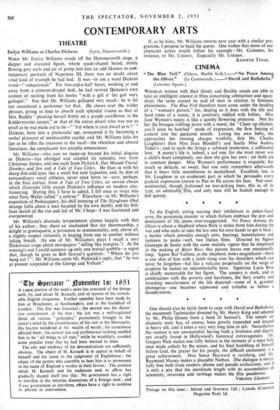CONTEMPORARY ARTS
THEATRE
WHEN Mr. Emlyn Williams strode off the Hammersmith stage, a dapper and cravated figure, whose spade-shaped beard, trimly flowing grey curls and air of pomp lent him an odd likeness to corf- temporary portraits of Napoleon III, there was no doubt about what kind of triumph he had had. It was—to use a word Dickens loved—" unequivocal." For two-an4-a-half hours, working at and away from a crimson-draped desk, he had revived Qickens's own custom of reciting from his books " with a gift o' the gab wery gallopin'." Not that Mr. Williams galloped very much ; he is far too considered a performer for that. He chews over the wilder phrases, giving us time to absorb such splendid visions as that of Mrs. Raddle " planting herself firmly on a purple cauliflower in the Kidderminster carpet," or that of the circus dwarf who was not as small as he was made out to be—" but where is your dwarf as is .? ' " Dickens, born into a plutocratic age, conquered it by becoming a verbal plutocrat of inexhaustible capital, and Mr. Williams licks his lips as he rifles the treasures in the vault—the relentless and absurd literalness, the complacent but amiable omniscience.
Mr. Williams—who uses no make-up beyond his initial disguise as Dickens—has abridged and adapted six episodes, two from Christmas Stories, and one each from Pickwick, Our Mutual Friend, Dombey and Son and A Tale of Two Cities. He fixes us with his sharp fish-cold eyes, like a small but sure hypnotist, and, by dint of extraordinary vocal athletics, never once bores us—save, perhaps, in the final extract, from A Tale of Two Cities, an unwise choice which illustrates little except Dickens's influence on modern elec- tioneering. During this, I have to admit, I fell once or twice into what Tony Weller called " a referee." Elsewhere—in Mr. Williams's exposition of Podsnappery, his chill intoning of The Signalman (that strange fable about a man haunted by his own death), and his bril- liant sketch -of the rise and fall of Mr. Chops—I was fascinated and overpowered.
Mr. Williams's dramatic tempertinent chimes happily with that of his author ; they share an unabashed flair for showmanship, a delight in grotesquerie, a proneness to sentimentality, and, above all, a slightly suspect virtuosity in leaping from one to another without taking breath. (In one of Mr. Williams's plays I recall a very Dickensian trope about newspapers " selling like ninepins.") At the evening's end I'could summon up only one textual quibble—a regret that, though he gives us Bob Sawyer's question: " Where do you hang out ? ", Mr. Williams omits Mr. Pickwick's reply, that " he was at present suspended at the George and Vulture." If, as he hints, Mr. Williams returns next year with a similar pro- gramme, I propose to head the queue. One wishes that more of our character actors would follow his example—Mr. Guinness, for instance, or Mr. Ustinov. Especially Mr. Ustinov.
KENNETH TrNAN.


































 Previous page
Previous page